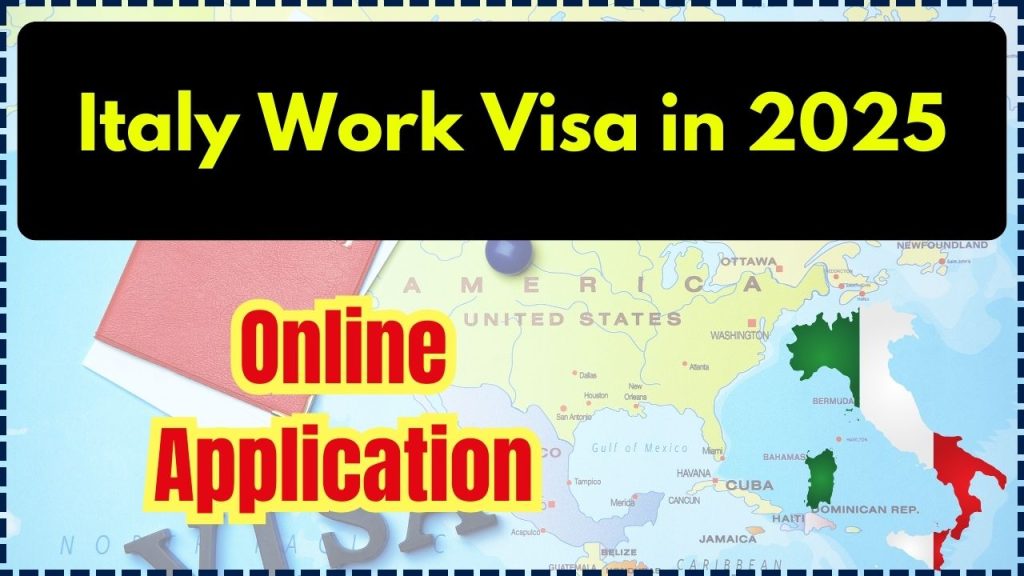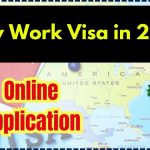Italy Work Visa in 2025: Italy is not just known for its stunning architecture, world-famous cuisine, and rich culture—it’s also a land of growing opportunities for international professionals. If you’re planning to work in Italy in 2025, securing the right work visa is your first step. This comprehensive guide will walk you through the online application process, eligibility requirements, and what you need to succeed.
Italy Work Visa in 2025
An Italy work visa in 2025 unlocks a world of opportunities for professionals seeking to grow their careers in one of Europe’s most captivating countries. From navigating the application process to settling into Italian life, this guide equips you with all the tools you need to succeed. With proper preparation and persistence, your Italian work dream is well within reach.

| Feature | Details |
|---|---|
| Visa Type | Italy Work Visa (Subcategories: EU Blue Card, Seasonal Work Visa, etc.) |
| Eligibility | Non-EU citizens with a valid job offer |
| Processing Time | Typically 2–4 months |
| Application Mode | Online via the Italian Ministry of Foreign Affairs |
| Visa Duration | 6 months to 2 years (renewable) |
Why Work in Italy?
Italy offers more than picturesque landscapes; it boasts a diverse economy with opportunities in engineering, IT, fashion, tourism, and agriculture. With a work-life balance rooted in Italian culture, professionals can thrive both personally and professionally. The work visa process ensures you can legally work while enjoying access to Italy’s robust healthcare and education systems.
Eligibility Criteria
Before you apply, confirm you meet these requirements:
1. Job Offer
- A valid job offer from an Italian employer is mandatory.
- The employer must apply for a Nulla Osta (work permit) on your behalf.
2. Skills & Qualifications
- Relevant education or experience required for your job.
- Some professions may require certifications recognized in Italy.
3. Annual Quota (Decreto Flussi)
- Italy imposes a quota on work visas through its Decreto Flussi program.
- Check if your job falls within the annual quota limits.
4. Financial Proof
- You must prove financial stability to support yourself initially.
5. Nationality
- Non-EU citizens are eligible to apply for the work visa.
Step-by-Step Guide to Apply for an Italy Work Visa in 2025
Step 1: Secure a Job Offer
- Search for jobs through platforms like LinkedIn or EURES.
- Once hired, your employer will apply for a Nulla Osta at the immigration office.
Step 2: Confirm Quota Availability
- The Decreto Flussi program releases an annual quota for specific job categories.
- Stay updated on quotas via the Italian Ministry of Interior website.
Step 3: Prepare Required Documents
Collect the following documents for your visa application:
- Completed Visa Application Form
- Valid Passport (minimum 3 months beyond visa duration)
- Nulla Osta (issued by the immigration office)
- Employment Contract
- Proof of Accommodation in Italy
- Financial Statements showing sufficient funds
- Health Insurance (minimum coverage of €30,000)
- Educational Certificates and Translations (if required)
Step 4: Submit Your Online Application
- Log in to the Italian Ministry of Foreign Affairs portal.
- Complete the application form and upload necessary documents.
- Book an appointment at your local Italian consulate or embassy.
Step 5: Attend the Appointment
- Submit hard copies of your documents.
- Provide biometric data (fingerprints and photo).
- Pay the visa application fee (€116).
Step 6: Track Your Application
- Use the embassy’s tracking system to monitor the status of your application.
Step 7: Travel to Italy
- Once your visa is approved, travel to Italy and apply for a Residence Permit (Permesso di Soggiorno) within 8 days of arrival.
Types of Work Visas in Italy
1. EU Blue Card
- For highly skilled workers earning at least €24,789 per year.
- Suitable for IT professionals, engineers, and researchers.
2. Seasonal Work Visa
- For temporary jobs in agriculture, tourism, or hospitality.
- Valid for 6–9 months.
3. Self-Employment Visa
- For freelancers or entrepreneurs.
- Requires a detailed business plan and proof of financial resources.
4. Intra-Company Transfer Visa
- For employees transferring within the same company to an Italian branch.
Post-Arrival Requirements
- Apply for Residence Permit:
- Visit a local post office and submit your Permesso di Soggiorno application.
- Register with Local Authorities:
- Enroll at the Anagrafe (Registry Office) for a residence certificate.
- Health Insurance:
- Sign up for the Italian National Health Service (SSN) to access healthcare.
- Tax Code:
- Obtain a Codice Fiscale (Tax Code) to open a bank account or sign rental agreements.
Costs and Processing Times
| Expense | Approximate Cost |
|---|---|
| Visa Application Fee | €116 |
| Residence Permit Fee | €76–€200 |
| Health Insurance | €50–€100 per year |
| Document Translation | €20–€50 per document |
Processing Time: Applications typically take 2–4 months to process, so plan accordingly.
Benefits of Working in Italy
- Work-Life Balance: Italians value family time and leisure, ensuring a balanced lifestyle.
- Global Mobility: Work visa holders can travel across the Schengen Area.
- Career Opportunities: Growth in industries like fashion, IT, and automotive.
- Cultural Enrichment: Enjoy Italy’s art, history, and culinary delights.
Italy Work Visa 2025 – New Application Process, Eligibility, Requirements
Mauritania e-Visa 2025 – Apply for New Application, Eligibility, Requirements
UAE Golden Visa 2025 – Check New Applicant Criteria, Process, Requirements
Frequently Asked Questions (FAQs)
1. How long does it take to get an Italy work visa?
The process typically takes 2 to 4 months, depending on the embassy workload and completeness of your application.
2. Can I switch jobs on a work visa?
Yes, but your new employer must obtain a new Nulla Osta for you.
3. Do I need to learn Italian to work in Italy?
Italian proficiency is not mandatory but greatly enhances job prospects and integration.
4. Can my family join me in Italy?
Yes, family members can apply for a Family Reunification Visa, provided you meet the income requirements.
5. Is the visa application fee refundable?
No, the €116 fee is non-refundable, even if your application is rejected.






